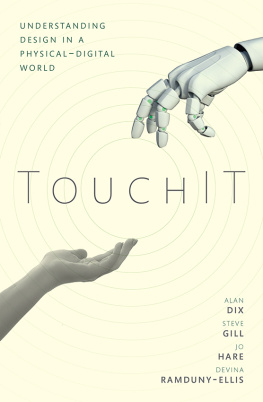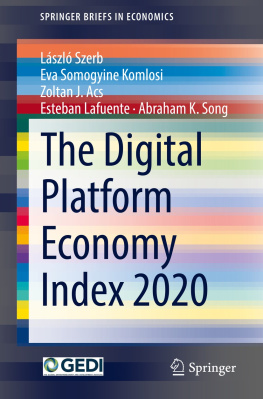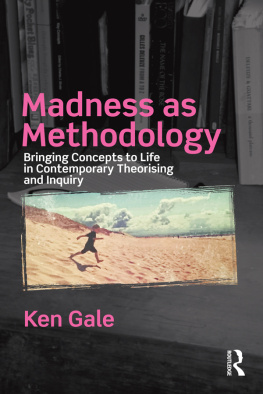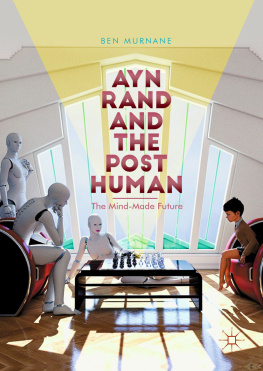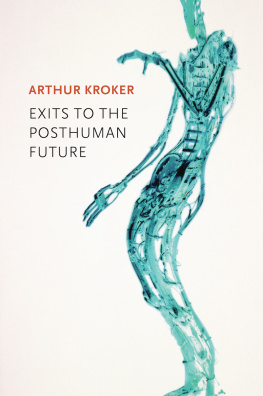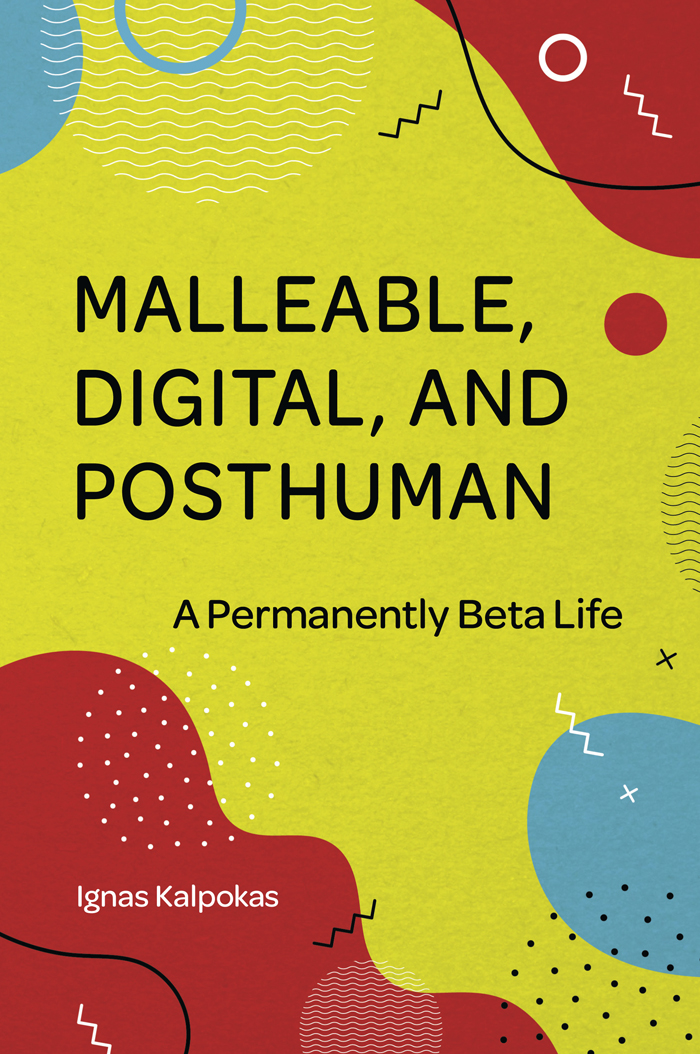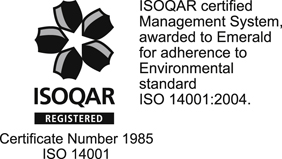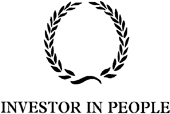Malleable, Digital, and Posthuman: A Permanently Beta Life
BY
IGNAS KALPOKAS
Vytautas Magnus University, Lithuania

United Kingdom North America Japan India Malaysia China
Emerald Publishing Limited
Howard House, Wagon Lane, Bingley BD16 1WA, UK
First edition 2021
Copyright 2021 Ignas Kalpokas
Published under exclusive licence by Emerald Publishing Limited
Reprints and permissions service
Contact:
No part of this book may be reproduced, stored in a retrieval system, transmitted in any form or by any means electronic, mechanical, photocopying, recording or otherwise without either the prior written permission of the publisher or a licence permitting restricted copying issued in the UK by The Copyright Licensing Agency and in the USA by The Copyright Clearance Center. Any opinions expressed in the chapters are those of the authors. Whilst Emerald makes every effort to ensure the quality and accuracy of its content, Emerald makes no representation implied or otherwise, as to the chapters' suitability and application and disclaims any warranties, express or implied, to their use.
British Library Cataloguing in Publication Data
A catalogue record for this book is available from the British Library
ISBN: 978-1-80117-621-7 (Print)
ISBN: 978-1-80117-620-0 (Online)
ISBN: 978-1-80117-622-4 (Epub)
This book is dedicated to my daughter Rachele Ona, who was born at the beginning of my writing process.
Table of Contents
Acknowledgements
Where do I even start giving thanks for making it possible to write a book in the midst of the pandemic? As usual, at the top of the list must be my wife Julija, without whose help and support this book would have been impossible. Then my boys Klemensas and Frederikas, who struggle to understand the concept of their parents working from home. And who can blame them?
Then things get messier testament to a very messy year indeed. A big thank you to my students, whom I have come to know perhaps more closely than I would otherwise would their home environments, their kitchen (and, well, other) sounds, etc., and, no doubt, this has been mutual. Worn down by lockdown, by writing, by being confined to home with the children, they have known me at my worst and most miserable. And, in some cases, so have I.
It is by no means a surprise that this is a book about interconnectedness and malleability through mutual testing. Even though the book was started in the months prior to the pandemic, the experience of 2020 has certainly further underscored the fallacy of anthropocentrism, of any idea that we can lead self-sufficient lives insulated from our environment. Definitely, 2020 was the year when the world struck back both nature and, in response to the nature-induced crisis of the pandemic, the technological layer of our existence. Combining life in full knowledge of being a mere node in multiple intersecting agglomerations in a social environment still primed to human exceptionalism, one that formulates demands accordingly, is bound to be a challenging experience. Hence, this book is written in the hope that we will leave the pandemic world wiser and not with our heads more deeply buried in sand. Let's explore!
Introduction
This book focusses on the increasing malleability and fluidity of the world and, especially, of the human a process that renders both the self and the environment into a permanently beta version, co-constituted within agglomerations of platforms, devices, physical infrastructures and humans. It is argued that, due to the multi-way relationships that characterise such agglomerations, both stability and predictable change are lacking (contrary to the mainstream promise of data to bring transparency and predictability), giving rise to a permanently beta existence. As it is hardly possible to analyse this condition from a mainstream anthropocentric framework, this book also proposes a posthumanist research methodology for future research in this area.
Living the New Reality
While this book is the result of a prolonged writing process, significant parts of the text were produced while spending the coronavirus lockdown of spring 2020 in the small village of Laktuiai in the middle of rural Lithuania. Meanwhile, the closing stages dragged into the second lockdown, in the following autumn and winter, struggling with pandemic realities, school closures and other attributes of the new reality while cramped in our family apartment in Kaunas. Perhaps if there ever was a need for an event that would underscore the futility of anthropocentric accounts of the world, the coronavirus pandemic certainly hit the spot, turning humans, for the most part, into passive observers of their neat and comfortable world and convenient lifestyles crumbling. No less, the disruption to, in many cases, almost complete stoppage of social life, the ensuing condition of working, learning and socialising online from home that had replaced face-to-face interactions with their mediatised versions and the resulting changes in everyday culture have made the book's effort to demonstrate the critical importance of mutually constructive interrelationships between humans, code, data, technology, etc., ever more pertinent. Likewise, all of the preceding the crumbling of what was seemingly stable and taken for granted as well as the clear primacy of interactivity point to the core assertion of permanent malleability of life itself.
Also pertinent to the argument made was the personal experience of moving, albeit temporarily, into a rural community and a reliving of the life and its entanglements often relegated to the margins by our falsely anthropocentric civilisation. The whimsicality of the weather, the capacity of frost to destroy the fruits of human labour, the necessity to live with, rather than conquer, nature, the seasonal changes of life and vegetation all of those (and many other) aspects of life can easily be (and usually are) lost under the conditions of contemporary urban-first life. Nevertheless, if this was merely a rural idyll or some kind of Walden-like utopia, it would be far less interesting. However, once this experience is paired with the newly found complexity of everyday activities, such as trying to do synchronous online teaching while simultaneously looking after three small children whose school and nursery had closed, and with the dependence on the reliability of Internet connection and of one's devices for even the most basic necessities like food (apparently, it is possible to get almost anything delivered even to a village quite far away from any major city) and work, then the flat ontology advocated in the final chapter of this book makes immediate sense. Hence, in this way and others, the pandemic has served as a quasi-Heideggerian moment of unconcealment in which the true nature of Being allows a glimpse of itself.
Notably, the Being thereby unconcealed has its own specific presence that is far removed from anything stable and unitary instead, this book is about life that is lived as part of co-present entanglements within complex and hybrid agglomerations. These agglomerations are complex because they involve multiple and multidirectional relations of causation: each agglomerated element is simultaneously constitutive of and constituted by at least one (although usually many more) other agglomerated element(s); likewise, such agglomerations are hybrid because they are composed of elements of very different nature tangible and intangible, natural and artificial, present and imaginary, etc. While a finite list of elements thus agglomerated is hardly possible, for the purposes of this book, the agglomerations will be primarily seen to include humans, code (which also includes algorithms and the broader digital architecture), data, devices (including both actively used, such as smartphones, and passively used, such as ubiquitous sensors), networks and other technological infrastructure, signals that travel through the networks, the natural environment, mental constructs (such as ideas and identities), etc. Moreover, the term agglomeration is intentional. While, for example, posthumanist scholars typically use the term assemblage, it is held that the latter still carries too much intentionality: for something to be an assemblage, there needs to be an assembling action or at least intention. The term agglomeration, meanwhile, provides for greater spontaneity and internal co-constitution.


